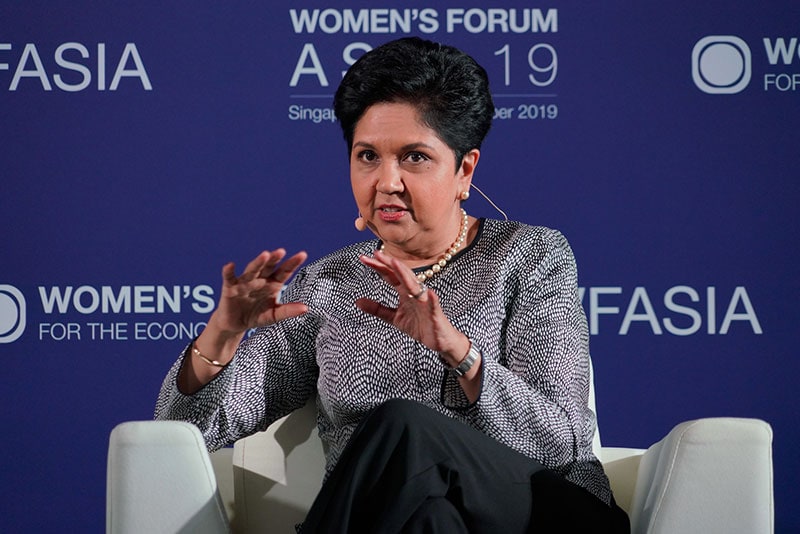Women’s Forum Asia 2019: The Importance of Inclusive Leadership
Inclusion. That was one of the key themes of the second edition of the Women’s Forum Asia, held at the Raffles City Convention Center. More than a buzzword or an action plan for companies to get in the good graces of their clients and employees, inclusion is an “economic necessity”, as Indra Nooyi, the former CEO of PepsiCo and current board member of Amazon, put it during a panel discussion with Gordon Watson, the CEO of AXA Asia, and Sandhya Devanathan, Facebook’s country director for Singapore.

What does inclusivity in the workplace really mean and look like? At its core, it’s about providing equal opportunities to everyone, regardless of one’s race, gender and background. And by “everyone”, it means every current and future employee. You could implement an equal pay policy, while still having a largely male-dominated office led mostly by men. An environment like that automatically creates a distinct culture that women and individuals from minority groups wouldn’t feel comfortable in.
Inclusivity requires a top-to-bottom overhaul. Instead of simply providing opportunities, companies must see to it that those opportunities are seized by the right people. That means introducing a critical mass, hiring 50 diverse individuals alongside 50 men, for instance. Force it into the company if you have to. It may feel unnatural, almost like a form of partiality, but the numbers will help elevate minority voices and change the culture into one that is truly inclusive. You have to start somewhere. Indra assures, “In the early days, it’s okay to have the mandates. It’s okay to say you’ve got to have at least 30% of your board be women by 2022.”
On the other side of the hiring table, it’s best to avoid being the first woman in any board, team or company. Being the token woman, the first diversity hire, you’ll have to tolerate all the same issues of not having your voice heard. It’s a detour back to square one, and it’s hardly a consequential move.
Likewise, if you want your business to become genuinely inclusive, you’ll need to take leaps, not steps. Hire 100 women at one go. Promote the same number of women and men each year. If there’s only a single woman in a meeting room full of men, she’ll either be invisible and start mimicking her masculine counterparts instead of actually representing her gender, a counterproductive consequence that negates any progress the firm has made in moving the needle on inclusivity and diversity. Remember: Only earthquakes are capable of moving mountains.
At the same time, be careful not to hire solely for the sake of hitting a quota. The goal is to hire the best and the brightest, and alienating a certain gender or race impedes your ability to sift out the cream of the crop. Besides being a sensible strategy for attracting the best talents, it benefits the company from the consumer’s point of view as well. Here’s a case in point: To do well, your business must reflect its consumer base. If the lion’s share of your customers come from Africa, you’ll need employees with the same heritage and experiences that understand that market intimately. That’s almost impossible to pull off if everyone that works for you are white Americans, for instance.
Still, it seems contradictory to do both: judging candidates based on their competency, while making sure you’ve got an equal number of diverse individuals. It’s like being blind and not blind at the same time to gender and race. Once you’ve gotten these recruits in, the way you lead matters too. There’s no point bringing in the most skilled individuals, especially when they come from minority communities, only to tear them down and strip them of their confidence. Things like interrupting them and belittling their opinions—basically anything that makes them feel undervalued, unappreciated and unnoticed—will diminish their self-confidence, which in turn affects their competence.
The better path forward involves not just respecting and recognising their voices, but making it a point to publicly invite them to take the stage and speak their mind. Don’t wait for them to say something. Solicit their opinion outrightly. By the same token, if you witness instances of employees demeaning minorities in the office, call them out in the moment. Don’t pull them aside for a chat for the sake of “civility”. Confronting bad behaviour upfront sends a signal across all levels of the company, and shapes the culture of your workplace.
It’s typical of motivational speakers and advisors to recommend and encourage baby steps when one is cultivating a new habit or making major lifestyle changes. They say if you start off at full throttle, you’ll run out of gas just as quickly. When it comes to inclusive businesses and leadership, however, there’s no time for buffers. It’s now or never, all in or nothing at all.


